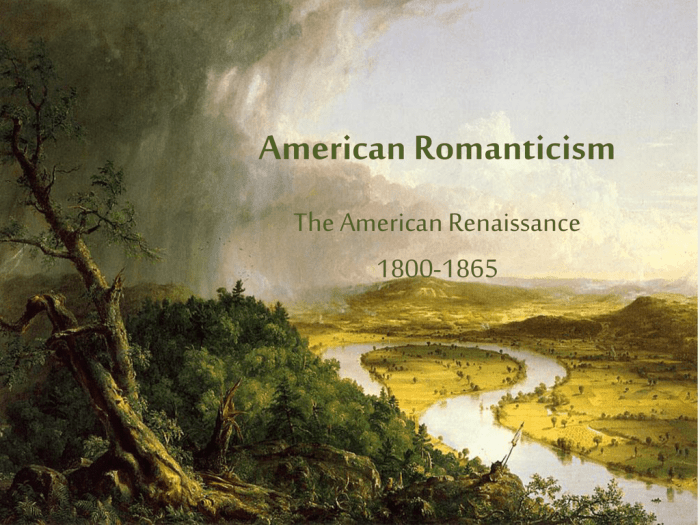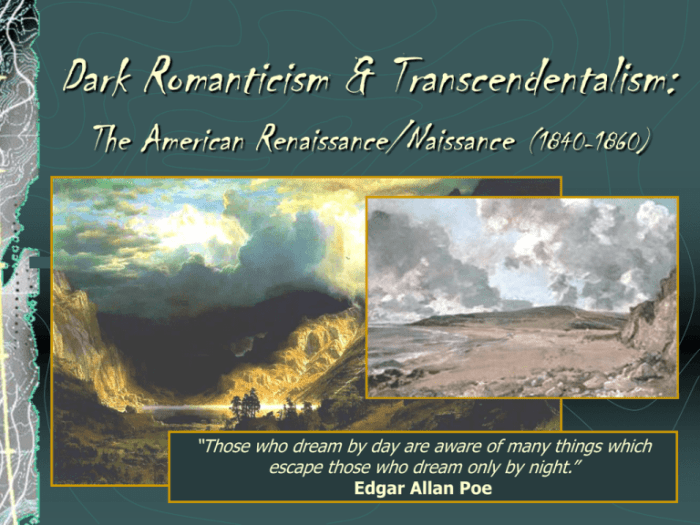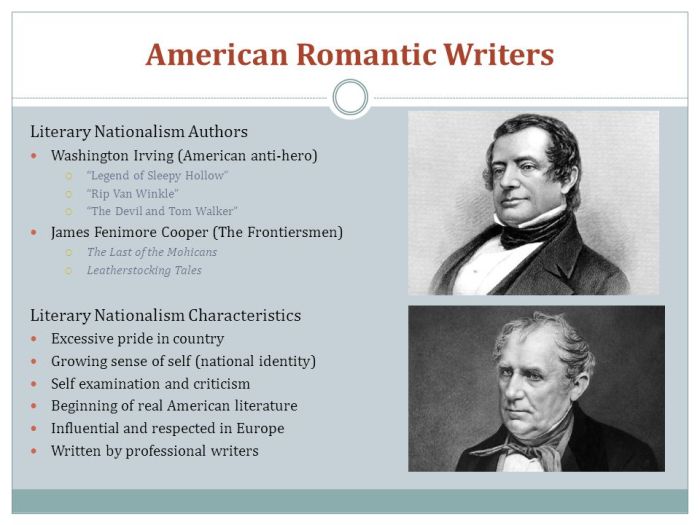Transcendentalism a subgenre of american romanticism – Transcendentalism, a subgenre of American Romanticism, emerged as a distinctive literary and philosophical movement in the 19th century. Its proponents, including Ralph Waldo Emerson and Henry David Thoreau, emphasized the inherent goodness of nature, the importance of intuition and individualism, and the existence of an “Over-Soul” connected to the divine.
Transcendentalist literature is characterized by the use of symbolism, allegory, and nature imagery, as well as an emphasis on self-reliance, nonconformity, and the pursuit of truth. Major works of the movement include Emerson’s “Nature” and Thoreau’s “Walden,” which explore these themes and literary devices.
Historical Context of Transcendentalism: Transcendentalism A Subgenre Of American Romanticism

Transcendentalism emerged as a subgenre of American Romanticism in the early 19th century. It was a philosophical and literary movement that emphasized the inherent goodness of nature, the importance of intuition and individualism, and the belief in a divine or “Over-Soul” that connected all living beings.
Key figures associated with the movement included Ralph Waldo Emerson, Henry David Thoreau, and Margaret Fuller. They sought to transcend the materialism and rationalism of the Enlightenment era and embrace a more spiritual and intuitive approach to life.
Philosophical Tenets of Transcendentalism
Transcendentalists believed that nature was a source of wisdom and inspiration. They advocated for self-reliance, nonconformity, and the pursuit of truth. They rejected traditional religious dogma and emphasized the importance of individual experience and intuition.
The concept of the “Over-Soul” was central to Transcendentalist philosophy. It referred to a divine or universal spirit that permeated all living beings and connected them to the divine.
Literary Characteristics of Transcendentalism, Transcendentalism a subgenre of american romanticism
Transcendentalist literature often employed symbolism, allegory, and nature imagery to convey philosophical ideas. It emphasized the importance of self-reliance, nonconformity, and the pursuit of truth.
- Symbolism: Transcendentalists used symbols to represent abstract ideas or concepts. For example, the forest often represented the human soul, while the mountain represented the divine.
- Allegory: Transcendentalists used allegories to tell stories that conveyed moral or philosophical lessons. For example, Hawthorne’s “The Scarlet Letter” is an allegory about the consequences of sin.
- Nature imagery: Transcendentalists often used nature imagery to describe their experiences and insights. For example, Thoreau’s “Walden” is a celebration of the beauty and wisdom of nature.
Major Works of Transcendentalism
Two of the most important works of Transcendentalist literature are “Nature” by Ralph Waldo Emerson and “Walden” by Henry David Thoreau.
- “Nature”: In this essay, Emerson argues that nature is a source of wisdom and inspiration and that humans should seek to live in harmony with it.
- “Walden”: In this book, Thoreau describes his experiences living in a cabin in the woods for two years. He explores themes of self-reliance, nonconformity, and the importance of nature.
Influence and Legacy of Transcendentalism
Transcendentalism had a profound impact on American literature, philosophy, and culture. It inspired the development of the American Renaissance and influenced the work of writers such as Walt Whitman, Herman Melville, and Nathaniel Hawthorne.
Transcendentalist ideas continue to resonate today, inspiring contemporary movements such as environmentalism and the search for spiritual meaning.
FAQ Guide
What is the main tenet of Transcendentalism?
Transcendentalists believed in the inherent goodness of nature, the importance of intuition and individualism, and the existence of an “Over-Soul” connected to the divine.
Who were the key figures associated with Transcendentalism?
Ralph Waldo Emerson and Henry David Thoreau were prominent figures in the Transcendentalist movement.
What is the significance of nature in Transcendentalist literature?
Nature was seen as a source of inspiration, wisdom, and spiritual connection for Transcendentalists.


